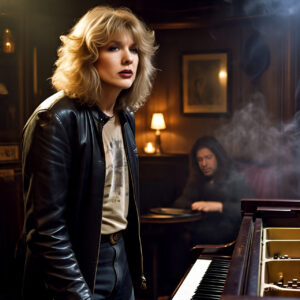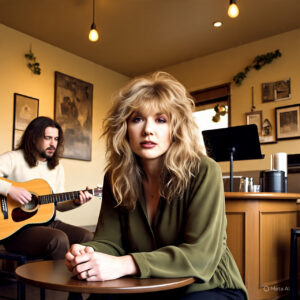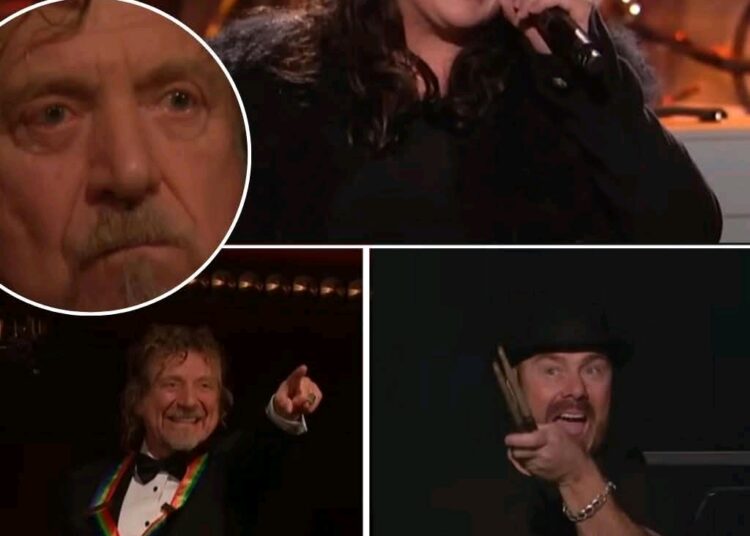The Kennedy Center Honors ceremony on December 2, 2012 was already buzzing with the electricity that comes from gathering the giants of American culture in one gilded room. But when the house lights dimmed for the evening’s final tribute and the opening arpeggio of “Stairway to Heaven” drifted from the stage, something changed in the air. On a balcony above, Jimmy Page leaned forward, John Paul Jones folded his hands, and Robert Plant—ever the golden-haired lion of Led Zeppelin—fixed his eyes on the performers below. No one, least of all Plant himself, expected what would happen over the next six minutes.
Ann and Nancy Wilson of Heart had been invited to honor Led Zeppelin, but they refused to offer a rote, note-for-note recreation. Instead, they built a slow-burn arrangement that embraced every ounce of the song’s grandeur while filtering it through the Wilsons’ own Pacific-Northwest mysticism and decades-deep respect for Zeppelin’s catalog. Nancy took the iconic twelve-string acoustic introduction, coaxing out each chord with deliberate patience, as Ann—one of the few rock vocalists whose range can spar with Plant’s mythic original—waited in the wings.
Then came the first surprise: a gospel choir, robed in black with scarlet sashes, filed in behind the band. In 1971, “Stairway” was a cryptic folk ballad metamorphosing into hard-rock catharsis; in 2012, it was about to gain a cathedral’s worth of soul. When Ann stepped to the microphone and delivered the opening line—“There’s a lady who’s sure all that glitters is gold”—her voice carried the weight of 40 years of reverence, yet sounded impossibly fresh. Plant’s expression softened. He’d sung those words thousands of times, yet here they were, shimmering anew.

Midway through, a hush swept the hall as the choir’s harmonies rose like stained-glass light. Jason Bonham, son of Zeppelin’s late drummer John Bonham, sat at the kit wearing his father’s trademark bowler hat. His presence formed an unspoken bridge between past and present. When the dynamic shift hit—Jimmy Page’s descending riff that signals the song’s volcanic second act—Jason unleashed the thunder his father once commanded, echoing family genes on the snare and toms.
Still, the emotional epicenter was Plant. Cameras caught him first smiling, then blinking rapidly, fighting the tide. Over four decades he had weathered the burden of “Stairway,” a song so canonized that it occasionally felt like a cage. He’d sometimes refused to perform it, calling it “a millstone.” But hearing it reimagined by peers who understood both its majesty and its vulnerability dismantled those defenses. By the time Ann belted the climactic “And as we wind on down the road,” the gospel choir behind her swelling into a wall of celestial sound, Plant’s eyes glistened. A tear traced down his cheek; he laughed at himself, touched a hand to his heart, then let the emotion flow.
The moment detonated online. Within hours, clips of Plant’s tears ricocheted across social media feeds, accompanied by breathless captions: “ROBERT PLANT CRIES!” Yet what captivated viewers wasn’t schadenfreude—it was the authenticity. Rock gods, we’re taught, are granite icons. Seeing one undone by the power of his own creation reminded millions that music’s true currency is feeling, not perfection. Today the performance hovers near 200 million views on YouTube, attracting new generations who, long after Zeppelin’s heyday, still crave that raw communion between artist and audience.
Musically, the Wilsons’ rendition stands tall because it never tries to out-Zeppelin Zeppelin. The arrangement honors every original contour—the gradual acceleration, the dizzying solo section, the dramatic ritard into the final “to be a rock and not to roll.” But Heart weaves in fresh textures: a subdued organ hum, choral call-and-response lines that frame Ann’s powerhouse belts, and Nancy’s crystalline acoustic picking that grounds the song’s more bombastic peaks. Page’s grin throughout is unmistakable approval; John Paul Jones, consummate stoic, nods in time; Plant wipes another tear as the final chord rings.

When the last cymbal crash decayed, the hall erupted. President Obama, seated just below the Zeppelin trio, turned to applaud them before applauding Heart, grasping the recursive magic of the tribute. Plant rose, placed a hand over his chest, and mouthed “thank you.” In that instant, the mythology of Led Zeppelin wasn’t diminished by human vulnerability—it was elevated. If the song had once felt like a millstone, the Wilsons transformed it into a garland of shared gratitude.
“Stairway to Heaven” endures because it transcends genre and generation, inviting listeners on a journey from hush to howl, uncertainty to affirmation. The 2012 Kennedy Center performance distilled that journey into a single visual: Robert Plant, eyes shining, reminded that art can come home to surprise its creator. It’s a lesson every musician secretly hopes for—that one day, their own song might travel the world and return bearing unexpected gifts. For Plant, the gift was a tear, witnessed by millions, proving that in the kingdom of rock, the bravest act is sometimes simply to feel.













